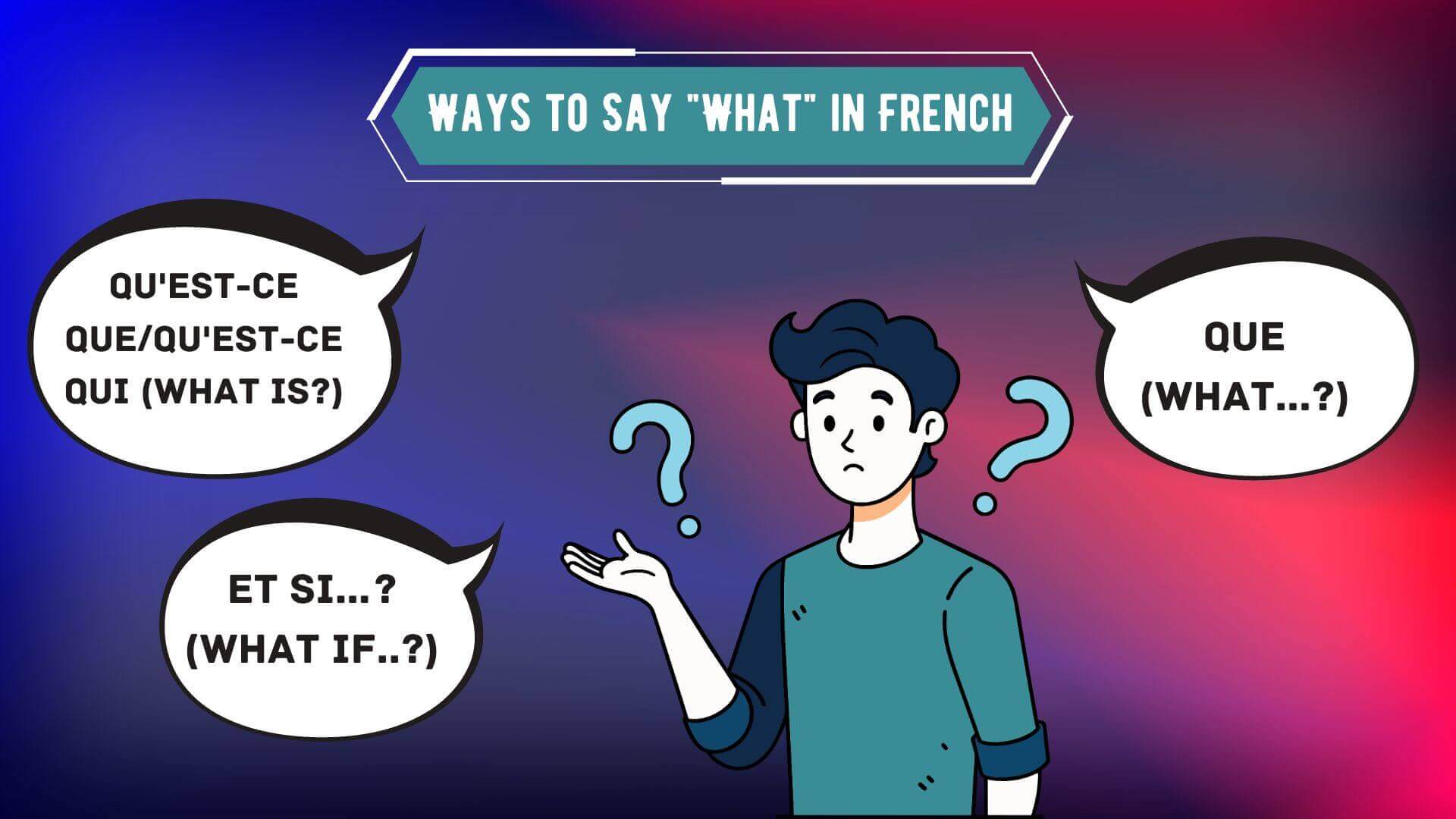In French, the word ‘what’ isn’t just one word; it can be several, each with its own role in a sentence. We’ll look at terms like ‘Qu’est-ce que’ and ‘Et si…?’ Knowing these will help you get better at asking questions and chatting in French. Let’s dive into these six terms to see how they’re different and how they add flavor to the language. We’ll see when to use them in daily talk or in more formal situations. This will boost your skills in French.
6 Ways to Say “What” in French

Qu’est-ce que/Qu’est-ce qui (What is?)
Qu’est-ce que and Qu’est-ce qui are basic French phrases we use to ask questions. You use ‘Qu’est-ce que’ when you want to know about an object or an action, like when you ask, ‘What are you doing?’ which in French is ‘Qu’est-ce que tu fais?’ It’s straightforward because it follows a verb.
Now, ‘Qu’est-ce qui’ is a bit different. You use it when you’re not sure who or what the subject is. This one comes before the verb. Think about asking, ‘What is happening?’ In French, you’d say ‘Qu’est-ce qui se passe?’ Both phrases help you ask clear questions in French, making it easier to find out what you need or to understand what’s going on.
Que (What…?)
‘Que’ is a common French question word. You often see it at the start of questions, like ‘Que fais-tu?’ which means ‘What are you doing?’ This structure is typical in formal settings.
To ask a question, you usually flip the order of the verb and the subject right after ‘Que’, like in ‘Que veux-tu manger?’ or ‘What do you want to eat?’ This setup helps ask specific questions clearly and effectively. Knowing how to use ‘Que’ correctly is key to understanding and using formal French questions.
Quoi (…What?)
‘Que’ often starts questions, but ‘Quoi’ is just as crucial in French, though used differently. Instead of coming before verbs like ‘Que’, ‘Quoi’ usually shows up at the end of questions or follows prepositions. For example, in casual chat, you might hear ‘Tu penses à quoi?’ which means ‘What are you thinking about?’ This shows how adaptable and common it is in daily French talk.
‘Quoi’ can also express surprise or disbelief, much like the English ‘What?’ when something unexpected happens. This makes ‘Quoi’ essential for getting the subtle points of French conversation.
Comment (What?)
In French, the word “comment” can be a more formal option than “quoi,” especially in questions. One main way to use “comment” is by swapping it with “quoi” to make a sentence sound more refined. For example, instead of asking “Tu fais quoi?” (What are you doing?) in casual speech, you could say “Tu fais comment?” in a more formal conversation. The meaning is the same, but “comment” adds a touch of formality.
You can also use “comment” as an exclamation to show surprise or ask for more details. If someone shares something shocking, you could reply, “Comment ? C’est incroyable !” (What? That’s incredible!). Or, if you hear unexpected news, like someone passing a tough exam, you might say, “T’as réussi l’examen ? Comment !” (Did you pass the exam? What!).
Also Read: 33 Unique Ways To Say ‘No’ In French [Formal And Informal]
Quel (What specifically?)
When you ask a specific question in French, you use ‘Quel’ to point to a particular noun. It changes based on the gender and number of the noun. This word means ‘which’ or ‘what’ in English, and it helps ask very clear questions.
For instance, when you say ‘Quel livre lisez-vous?’ you’re asking ‘Which book are you reading?’ The word ‘Quel’ changes like this: ‘Quel’ for a single masculine noun, ‘Quelle’ for a single feminine noun, ‘Quels’ for multiple masculine nouns, and ‘Quelles’ for multiple feminine nouns. Using it correctly helps you ask better questions and shows you know your French well.
Ce que / Ce qui / Ce dont / Ce À quoi (What as an Object)
Understanding the French phrases ‘Ce que’, ‘Ce qui’, ‘Ce dont’, and ‘Ce à quoi’ is crucial if you want to get a handle on how the language deals with objects and indirect objects in more complex sentences.
Let’s break it down. ‘Ce que’ is used to start clauses where ‘what’ is the object, like in ‘Je sais ce que tu veux’ which translates to ‘I know what you want.’
Next, ‘Ce qui’ is used when ‘what’ is the subject of the sentence. For example, ‘Ce qui m’intéresse est…’ means ‘What interests me is…’.
Then there’s ‘Ce dont’, which you use with verbs that need a ‘de’. An example is ‘Ce dont j’ai besoin’, which means ‘What I need’.
Lastly, ‘Ce à quoi’ fits with verbs that are followed by ‘à’, such as in ‘Ce à quoi elle pense’, meaning ‘What she is thinking about’.
Also Read: How To Say “Please” In French In Every Situation: A Simple Guide
Et si…? (What if..?)
In French, when you want to think about what could happen, you use ‘Et si…?’, which means ‘What if…?’. It helps you talk about different possibilities or imagine what might happen next.
For example, if you say ‘Et si nous allions au cinéma ?’, it’s like asking ‘What if we went to the movies?’. This way of speaking is useful in everyday chats and also in deeper discussions.
It lets people think about and talk over various scenarios, making conversations richer and more engaging. By using ‘Et si…?’, you can spark interesting talks and get creative with ideas.
Conclusion
Knowing different ways to say ‘what’ in French really helps you communicate better in various situations. When you get the hang of words like quoi, que, quel, and phrases like qu’est-ce que or ce qui, you start speaking French more fluently. This also helps you understand the subtle parts of the language, which is great for respectful and culturally sensitive conversations. Keep using these words as you talk and listen in French. The more you practice and get feedback, the better you’ll get. So, keep at it—talk, listen, and immerse yourself in French to boost your confidence and effectiveness. Keep visiting the Translation Blog for more articles like this.

